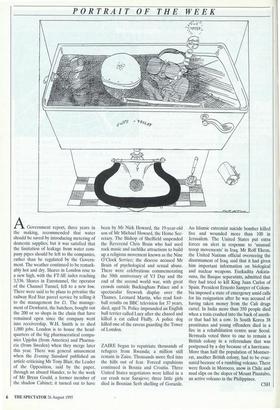PORTRAIT OF THE WEEK
AGovernment report, three years in the making, recommended that water should be saved by introducing metering of domestic supplies; but it was satisfied that the limitation of leakage from water com- pany pipes should be left to the companies, rather than be regulated by the Govern- ment. The weather continued to be remark- ably hot and dry. Shares in London rose to a new high, with the FT-SE index reaching 3,536. Shares in Eurotunnel, the operator of the Channel Tunnel, fell to a new low. There were said to be plans to privatise the railway Red Star parcel service by selling it to the management for £1. The manage- ment of Dewhurst, the butchers, bought out the 200 or so shops in the chain that have remained open since the company went into receivership. W.H. Smith is to shed 1,000 jobs. London is to house the head- quarters of the big pharmaceutical compa- nies Upjohn (from America) and Pharma- cia (from Sweden) when they merge later this year. There was general amusement when the Evening Standard published an article criticising Mr Tony Blair, the Leader of the Opposition, said by the paper, through an absurd blunder, to be the work of Mr Bryan Gould, a former member of the shadow Cabinet; it turned out to have been by Mr Nick Howard, the 19-year-old son of Mr Michael Howard, the Home Sec- retary. The Bishop of Sheffield suspended the Reverend Chris Brain who had used rock music and suchlike attractions to build up a religious movement known as the Nine O'Clock Service; the diocese accused Mr Brain of psychological and sexual abuse. There were celebrations commemorating the 50th anniversary of VJ Day and the end of the second world war, with great crowds outside Buckingham Palace and a spectacular firework display over the Thames. Leonard Martin, who read foot- ball results on BBC television for 37 years, died, aged 76. Police impounded an English bull terrier called Lucy after she chased and killed a cat called Fluffy. A police dog killed one of the ravens guarding the Tower of London.
ZAIRE began to repatriate thousands of refugees from Rwanda; a million still remain in Zaire. Thousands more fled into the hills out of fear. Forced expulsions continued in Bosnia and Croatia. Three United States negotiators were killed in a car crash near Sarajevo; three little girls died in Bosnian Serb shelling of Gorazde. An Islamic extremist suicide bomber killed five and wounded more than 100 in Jerusalem. The United States put extra forces on alert in response to 'unusual troop movements' in Iraq. Mr Rolf Ekeus, the United Nations official overseeing the disarmament of Iraq, said that it had given him important information on biological and nuclear weapons. Euzkadita Askata- suna, the Basque separatists, admitted that they had tried to kill King Juan Carlos of Spain. President Ernesto Samper of Colom- bia imposed a state of emergency amid calls for his resignation after he was accused of having taken money from the Cali drugs cartel. In India more than 350 people died when a train crashed into the back of anoth- er that had hit a cow. In South Korea 38 prostitutes and young offenders died in a fire in a rehabilitation centre near Seoul. Bermuda voted three to one to remain a British colony in a referendum that was postponed by a day because of a hurricane. More than half the population of Montser- rat, another British colony, had to be evac- uated because of a rumbling volcano. There were floods in Morocco, snow in Chile and mud slips on the slopes of Mount Pinatubo, an active volcano in the Philippines.
CSH


















































 Previous page
Previous page